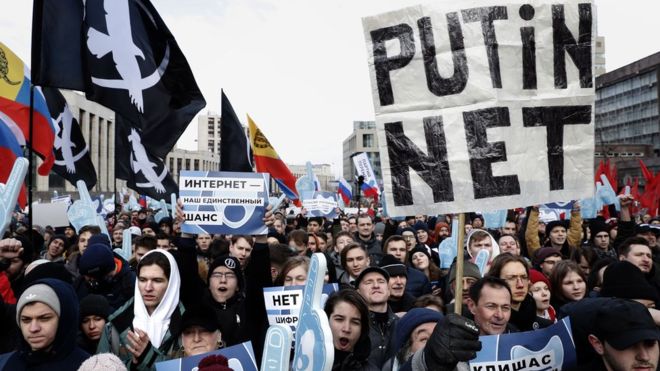• Topics / News from the CIS countries
• Topics / Human Rights Abuses in Russian-occupied Crimea
New Russian law could cut Crimea off from Ukrainian and global Internet

Russian-occupied Crimea could find itself totally cut off from the global Internet according to a bill which was adopted in its second reading on 11 April and has every chance of coming into force this year. Although the global Internet would purportedly only be blocked in case of a threat to Russia or if the Russian Internet was blocked from abroad, there is no clarity as to what would be deemed to constitute such a threat.
The ‘Internet isolation’ bill was officially proposed by Andrei Klishas, a Russian senator who has been under US and EU sanctions since 2014 for his active support of Russia’s aggression against Ukraine. The bill prompted protests in several Russian cities on 10 March this year, with the march in Moscow large by Russian standards. The second reading has still gone ahead and there seems little chance that Russia’s leadership, which is doubtless behind the bill, will retreat. Why would they, when the legislation provides another potent weapon against freedom of speech and access to information that the authorities want concealed?
The bill proposes the creation of an autonomous Russian segment of the Internet, which could be cut off from the Worldwide Web. All Russian providers will be forced, at their own expense, to install the technical means for controlling traffic on their network. While they will have to fork out the money for this, it will be Roskomnadzor, Russia’s effective censor, that will exercise such control. Roskomnadzor will be able to block or unblock Internet sites, which at the moment the provider has to be ordered to do.
In the event of some undefined ‘threat’, the Russian authorities will be able to use such technical means to effectively isolate the Russian Internet, allowing in only those parts of the global Internet that they consider necessary.
Russia either closed or took over Ukrainian media after its invasion and annexation of Crimea, and it has persecuted both journalists and civic journalists for expressing opinions not to its liking and / or reporting on repression under Russian occupation. The Crimean Human Rights Group has long reported on the widespread blocking of individual Ukrainian websites and media, and it has roundly condemned a bill which could, it says, impose “global censorship of the Internet in Crimea”.
The bill increases the already substantial (and repressive) role played by Roskomnadzor and the scope for the authorities to impose an Iron Curtain yet again on information from abroad. Since the bill in its present form does not spell out what will constitute sufficient threats to Russia’s infrastructure for such a wall to be lowered, there cannot be any real protection against abuse of the new restrictive powers that it envisages.





